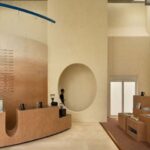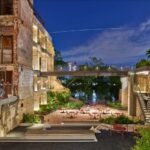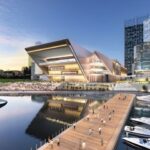Iconic 1970s Brutalist building becomes ‘Hotel Marcel’
A brutalist building designed by modernist architect Marcel Breuer five decades ago, has been revived as ‘Hotel Marcel’ in the heart of New Haven, Connecticut.
The historic landmark site was acquired by architecture studio Becker + Becker in 2019. The studio has spent the last three years rehabilitating its interiors, transforming a disused office hub into 165 hotel rooms, a lobby, a restaurant, a gallery, and a meeting space.

GALLERY
Named after Breuer, the project ultimately represents ‘a model for sustainable hospitality’, with a goal to become the first Passive House-certified hotel in the USA. ‘[It] addresses long-standing historic preservation and economic development priorities to create a high-quality hotel and meeting facility proximate to the waterfront, train stations, and major highways at the city’s gateway,’ state the architects.
Collaborating with Becker + Becker was US studio Dutch East Design who helped reconfigure and uplift the interiors to bring ‘Hotel Marcel’ to life. From furniture and lighting to material selection, the team created an overall ambience that exudes minimal elegance — with wooden finishing, white walls, and muted patterns comprising the main backdrop across several rooms.
As for the exterior, the architects focused on preserving the original facade design, repairing it where needed without compromising its striking form and brutalist relief. Shown by the images below, Breuer initially conceived the building in 1967 as a rectangular volume split in half, making room for a central void supported by columns. From the side, the architecture assumes an unsual yet captivating dual shape, making it stand out as a Connecticut landmark all those years.
Beyond aesthetic renovation, ‘Hotel Marcel’ hits impressive numbers when it comes to its Passive House features. For one, the architects fitted the building with more than 1,000 solar panels, providing 100% power for lighting, heating, and cooling. Additionally, Becker + Becker complemented the use of solar energy with recycled and locally sourced construction materials, high-performing thermal insulation, low-voltage POE/LED lighting, and electric car charging stations.
Images by Seamus Payne via Designboom
Set against the sea in Chennai, Eventide Coffee has been conceived as a calm architectural response to site, ...
American studio S9 Architecture has transformed a long-abandoned slaughterhouse site in Tennessee into the mixed-use Neuhoff District, repositioning ...
Sekisui House has reached the halfway mark of its $5 billion transformation of Melrose Park in Sydney’s west, ...
The Housing Industry Association has welcomed new data showing a steady uptake of incentives under the Key Apprenticeship ...
Two of Perth’s most significant city-shaping projects have hit critical turning points, with plans for the city’s tallest ...











